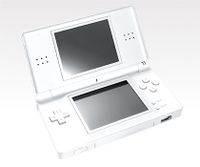Template:Articleabout Template:System-Infobox Template:LLQuote
The Nintendo DS is a handheld game system released by Nintendo in 2004. It features two 3" screens, (one of which being touch sensitive). It also introduces many new features to the Nintendo handheld lineup such as stereo sound, audio input (microphone) and 3D graphics. As with previous major Nintendo handhelds, the DS also provides backwards compatibility for GBA games (though this does not support multiplayer).
The DS is also the first Nintendo system to have a built-in wireless connection, allowing it to link up with other DS's without any wires or add-ons. This was also the first system Nintendo made to go online (Mario Kart DS being the first Nintendo made online game), using the Nintendo Wi-Fi Connection.
Nintendo DS Lite
A newer model named the Nintendo DS Lite was released in 2006 and contains all the features of the original Nintendo DS with some new features such as a significantly brighter screen (with four adjustment options), a lighter weight, and a smaller overall size (having the negative side effect of regular Game Boy Advance cartridge protruding out from the bottom, similar to playing a Game Boy or Game Boy Color cartridge in the Game Boy Advance).
Nintendo DSi
A third model, called the Nintendo DSi, was announced on October 2nd. [1][2] It is thinner and lighter than the Nintendo DS Lite, having removed the Game Boy Advance slot. However, this means that the Nintendo DS Rumble Pack, which was used with titles such as Mario & Luigi: Partners in Time, cannot be used. Two cameras, music playback functions, larger screens, and a Wii-like channel interface are added. It will also be able to download games from the Nintendo DS Shop, stored on an SD Card or in internal memory. It was released in Japan on November 1st, 2008. The Nintendo DSi will be released in North America, on April 5th, 2009.[3] and in Europe two days before, on April 3rd, 2009. The Europe price is €179,99. [4]
Stylus
The Stylus is a pencil-like accessory that comes with the Nintendo DS. The instrument is often used in conjunction with the Nintendo DS touch screen. Usually, the stylus is used to make menu selections, which the player can accomplish by bringing the stylus in contact with their selection on the touch screen. The stylus is often helpful or required in gameplay. For example, New Super Mario Bros., Super Mario 64 DS, and Wario: Master of Disguise require the use of the stylus for mini-games such as Wanted! and Roach Smash, and the stylus is also necessary to make Mini Mario toys jump, in Mario vs. Donkey Kong 2: March of the Minis.
On the DS, the stylus slot is located on the back, and is inserted downwards, relatively to the DS itself. On the DS Lite, however, it was relocated to the right side of the DS Lite, and is inserted from right to left, relatively to the DS Lite.
The stylus for the DS is noticeably thinner than the stylus for the DS Lite. A DS generally comes with two styluses, and extras can usually be purchased from stores or special ones from promotions.
See Also
Microphone
The Microphone is a feature on the Nintendo DS. On the original DS, it is at the lower left-hand corner, right below the screen. On the DS Lite, it is at the middle in between the two screens. Blowing into it will allow events to happen in the game that the player is playing, such as Toad Jump. In other games, the player must say words into the Microphone.
Game Gallery
- Diddyracingdscover.jpg
- 827565 lp.jpeg
- Nds-mariokart-jap.jpg
- MARIOPARTYDSBOXARTRP.jpg
- NewSuperMarioBrothers.jpg
- Superpeach.jpg
- 250px-Wariods.jpg
- 924913 59686 front.jpg
Trivia
- In Mario and Luigi: Partners in Time Shroobs call Shroob UFOs using a silver, flip-top communicator. Because the Nintendo DS has the capability to send verbal messages to friends, this may be a reference to the Nintendo DS.
- Additionally, Professor Elvin Gadd is shown to own a Nintendo DS in Mario & Luigi: Partners in Time, he uses this DS's apparent time radar to locate Princess Peach at the beginning of the game and later operates the Hydrogush 4000 with it.
- A stage based on the PictoChat included in the Nintendo DS is in Super Smash Bros. Brawl. Additionally, the stage has its very own emblem; the DS emblem.
- In Super Smash Bros. Brawl, one of the names that can appear whenever a player presses the random button when they're naming their custom stage is DS. DS is a reference of the name of this handheld.
- In Mario Kart DS, one of the courses is the Nintendo DS.
- In Super Paper Mario, there is a computer console called the Dining Specializer, which is modelled after the Nintendo DS Lite.
- In Super Paper Mario, there is also another appearance: a fortune teller ;Merluvlee wanted the Training Machine it a 2-screened handheld that resembles a Nintendo DS, she would use it to train her brain, which is a reference to Brain Age.
- In Super Mario 64 DS, Bowser makes several references about the Touch Screen, saying phrases like "Keep that Touch Screen Smoking!".
- DS stands for Dual-Screen.
References
- ^ http://www.nintendo.co.jp/ds/dsi.html
- ^ http://www.nintendo.co.uk/NOE/en_GB/news/2008/nintendo_introduces_dsi_9691.html
- ^ http://www.nintendo.com/whatsnew/detail/Q5D4ti_bPqJO_I0Oup0AMFudaUOLz6C7
- ^ http://www.nintendo.co.uk/NOE/en_GB/news/2008/nintendo_dsi_arrives_in_europe_on_3_april_2009_11627.html

